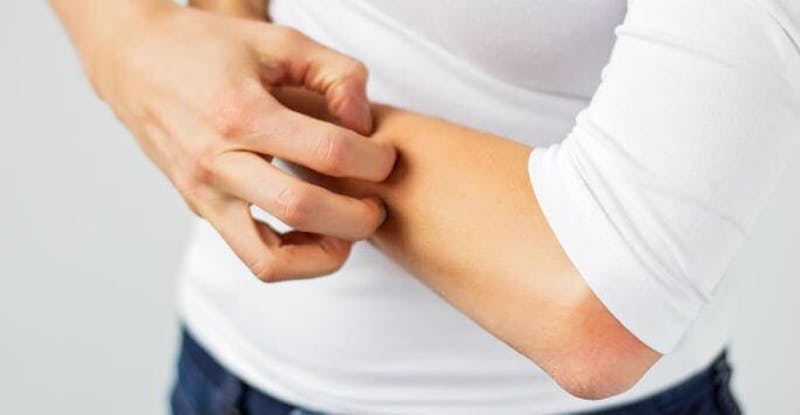
Psoriasis is a chronic skin disease that originates underneath the skin. It is related to the immune system and may range from mild to severe. It may be associated with other diseases, such as psoriatic arthritis, cardiovascular disease and type 2 diabetes. There are treatments and strategies that may help some people enjoy a healthy lifestyle depending on the type and severity of the condition. There are several forms of psoriasis, including:
- Vulgaris – the most common type with plaques
- Guttate – that has small spots
- Inverse – that develops in the folds of the underarms, groin or buttocks
- Pustular – that has small, yellow blisters filled with pus
- Palmoplantar – that develops on the palms of the hands or soles of the feet
- Erythrodermic – that develops anywhere on the body and causes the person to feel cold; it may cause congestive heart failure if the person has a preexisting heart condition
- Psoriasis may also develop on the nails, which is very hard to treat, and on the scalp
Psoriasis is also associated with inflamed joints. Called psoriatic arthritis, it may only affect the joints and not show on the skin. This form is serious and is treated with medications to stop the disease from getting worse. Psoriatic arthritis usually develops in people between 30 to 40 years old.
The symptoms of the different types of psoriasis vary, but most types appear as pink or red, scaly bumps that join together to form raised plaques of skin. While it can appear almost anywhere, it is usually seen in places that rub. It may have dry, white flakes that are pulled off when the plaque is scratched. A tiny drop of blood may appear, and this is a classic symptom called the Auspitz sign.
Toenails and fingernails may get small pits, turn yellowish-brown and separate from the nail bed. It should not be confused with a fungal infection. Guttate psoriasis may appear after you have a sore throat as small bumps or as itching, scaling skin over a large area.
Psoriasis that appears in moist areas such as the buttocks or navel often has flat, red plaques with little scaling. It may be confused with a fungal infection. Pustular psoriasis may appear as small, pus-filled bumps on the torso and the person may also have a fever. When the condition develops on the scalp, it may look like a bad case of dandruff.
Fortunately, there are treatments that can reduce the symptoms of the condition, even in severe cases. There are topical treatments that are applied directly to the plaques as well as oral medications. Light/laser therapy and biological medications may also be used. When you meet with our specialist at the Center for Dermatology in Lawrenceville, you may learn about the best treatment for your psoriasis. Contact us today to schedule a consultation.

